非谓语动词专题讲解
- 格式:doc
- 大小:81.50 KB
- 文档页数:6
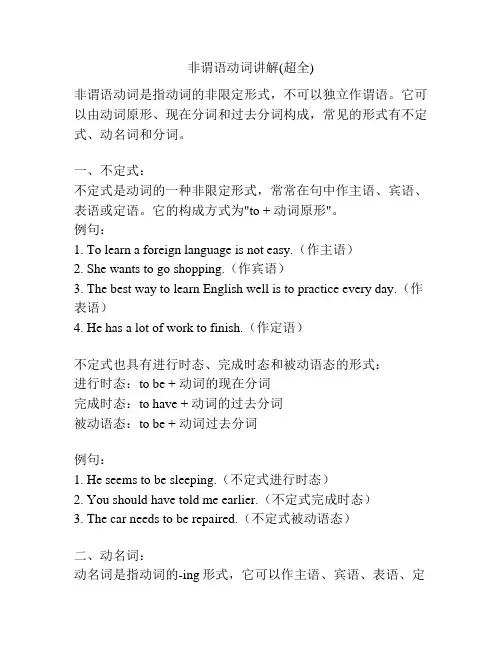
非谓语动词讲解(超全)非谓语动词是指动词的非限定形式,不可以独立作谓语。
它可以由动词原形、现在分词和过去分词构成,常见的形式有不定式、动名词和分词。
一、不定式:不定式是动词的一种非限定形式,常常在句中作主语、宾语、表语或定语。
它的构成方式为"to + 动词原形"。
例句:1. To learn a foreign language is not easy.(作主语)2. She wants to go shopping.(作宾语)3. The best way to learn English well is to practice every day.(作表语)4. He has a lot of work to finish.(作定语)不定式也具有进行时态、完成时态和被动语态的形式:进行时态:to be + 动词的现在分词完成时态:to have + 动词的过去分词被动语态:to be + 动词过去分词例句:1. He seems to be sleeping.(不定式进行时态)2. You should have told me earlier.(不定式完成时态)3. The car needs to be repaired.(不定式被动语态)二、动名词:动名词是指动词的-ing形式,它可以作主语、宾语、表语、定语或状语。
在句中的位置和用法与名词相似。
例句:1. Reading is my favorite hobby.(作主语)2. I enjoy swimming in the summer.(作宾语)3. Her dream is becoming a famous singer.(作表语)4. The girl standing over there is my sister.(作定语)5. He went to the party without saying goodbye.(作状语)动名词与不定式的区别在于动名词具有进行时态和被动语态,而不定式没有。
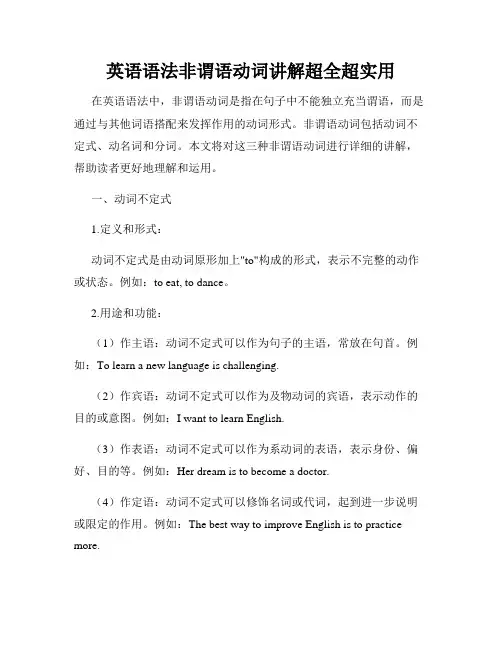
英语语法非谓语动词讲解超全超实用在英语语法中,非谓语动词是指在句子中不能独立充当谓语,而是通过与其他词语搭配来发挥作用的动词形式。
非谓语动词包括动词不定式、动名词和分词。
本文将对这三种非谓语动词进行详细的讲解,帮助读者更好地理解和运用。
一、动词不定式1.定义和形式:动词不定式是由动词原形加上"to"构成的形式,表示不完整的动作或状态。
例如:to eat, to dance。
2.用途和功能:(1)作主语:动词不定式可以作为句子的主语,常放在句首。
例如:To learn a new language is challenging.(2)作宾语:动词不定式可以作为及物动词的宾语,表示动作的目的或意图。
例如:I want to learn English.(3)作表语:动词不定式可以作为系动词的表语,表示身份、偏好、目的等。
例如:Her dream is to become a doctor.(4)作定语:动词不定式可以修饰名词或代词,起到进一步说明或限定的作用。
例如:The best way to improve English is to practice more.(5)作状语:动词不定式可以表示时间、目的、方式等状语的作用。
例如:I went to the park to relax.3.特殊用法:(1)省略to:在某些情况下,不定式的to可以省略,例如在助动词let、make、help等后面。
例如:Let me go.(2)动词不定式的时态:动词不定式没有人称和数的变化,但可以根据不同的时间来使用不同的时态。
例如:I want to go shopping.(现在时态)I wanted to go shopping.(过去时态)二、动名词1.定义和形式:动名词是由动词加上-ing构成的形式,可以作为名词使用。
例如:swimming, running。
2.用途和功能:(1)作主语:动名词可以作为句子的主语,常放在句首。
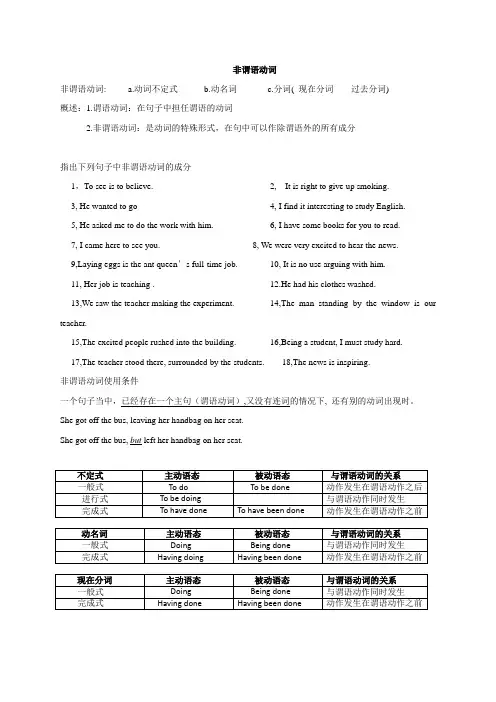
非谓语动词非谓语动词: a.动词不定式 b.动名词 c.分词( 现在分词过去分词)概述:1.谓语动词:在句子中担任谓语的动词2.非谓语动词:是动词的特殊形式,在句中可以作除谓语外的所有成分指出下列句子中非谓语动词的成分1,To see is to believe. 2, It is right to give up smoking.3, He wanted to go 4, I find it interesting to study English.5, He asked me to do the work with him. 6, I have some books for you to read.7, I came here to see you. 8, We were very excited to hear the news.9,Laying eggs is the ant queen’s full-time job. 10, It is no use arguing with him.11, Her job is teaching . 12.He had his clothes washed.13,We saw the teacher making the experiment. 14,The man standing by the window is our teacher.15,The excited people rushed into the building. 16,Being a student, I must study hard.17,The teacher stood there, surrounded by the students. 18,The news is inspiring.非谓语动词使用条件一个句子当中,已经存在一个主句(谓语动词),又没有连词的情况下, 还有别的动词出现时。

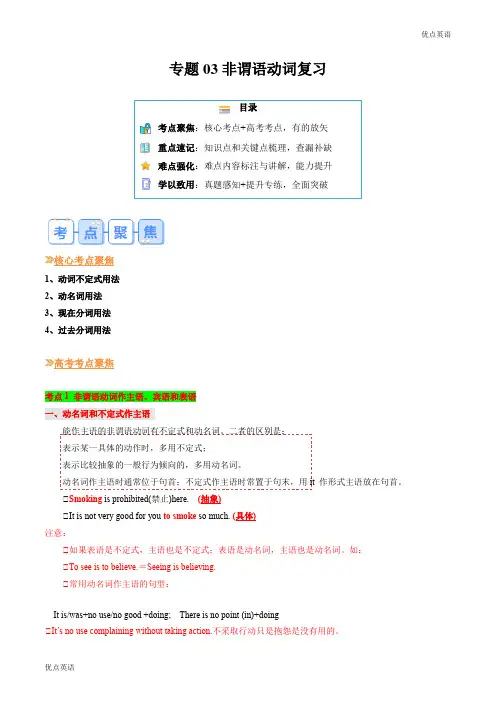
专题03非谓语动词复习目录考点聚焦:核心考点+高考考点,有的放矢重点速记:知识点和关键点梳理,查漏补缺难点强化:难点内容标注与讲解,能力提升学以致用:真题感知+提升专练,全面突破核心考点聚焦1、动词不定式用法2、动名词用法3、现在分词用法4、过去分词用法高考考点聚焦考点1 非谓语动词作主语、宾语和表语一、动名词和不定式作主语能作主语的非谓语动词有不定式和动名词。
二者的区别是:表示某一具体的动作时,多用不定式;表示比较抽象的一般行为倾向的,多用动名词。
动名词作主语时通常位于句首;不定式作主语时常置于句末,用it 作形式主语放在句首。
▶Smoking is prohibited(禁止)here. (抽象)▶It is not very good for you to smoke so much. (具体)注意:▶如果表语是不定式,主语也是不定式;表语是动名词,主语也是动名词。
如:▶To see is to believe.=Seeing is believing.▶常用动名词作主语的句型:It is/was+no use/no good +doing; There is no point (in)+doing▶It’s no use complaining without taking action.不采取行动只是抱怨是没有用的。
二、动名词和不定式作宾语1. 下列动词只能用不定式作宾语,请牢记下面的口诀决心学会想希望,拒绝设法愿假装。
主动答应选计划,同意请求帮一帮。
decide/determine,learn,want,expect/hope/wish; refuse,manage,care,pretend; offer,promise,choose,plan; agree,ask/beg,help。
此外,afford,strive,happen,wait,threaten等也要用不定式作宾语。
▶She pretended not to see me when I passed by.当我经过时,她假装没看见我。
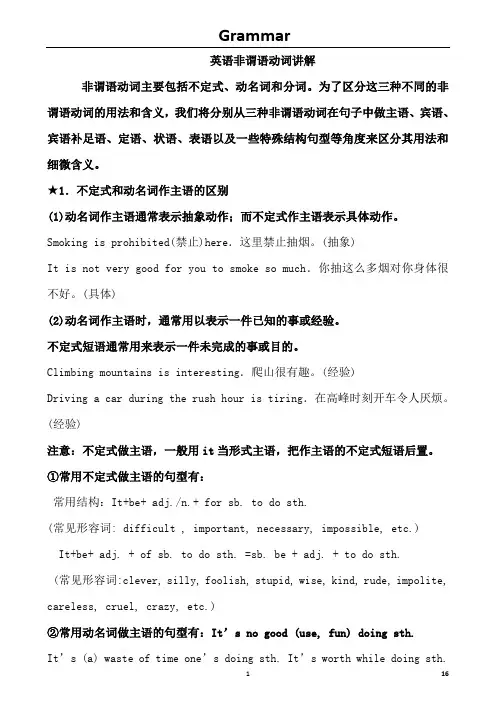
英语非谓语动词讲解非谓语动词主要包括不定式、动名词和分词。
为了区分这三种不同的非谓语动词的用法和含义,我们将分别从三种非谓语动词在句子中做主语、宾语、宾语补足语、定语、状语、表语以及一些特殊结构句型等角度来区分其用法和细微含义。
★1.不定式和动名词作主语的区别(1)动名词作主语通常表示抽象动作;而不定式作主语表示具体动作。
Smoking is prohibited(禁止)here.这里禁止抽烟。
(抽象)It is not very good for you to smoke so much.你抽这么多烟对你身体很不好。
(具体)(2)动名词作主语时,通常用以表示一件已知的事或经验。
不定式短语通常用来表示一件未完成的事或目的。
Climbing mountains is interesting.爬山很有趣。
(经验)Driving a car during the rush hour is tiring.在高峰时刻开车令人厌烦。
(经验)注意:不定式做主语,一般用it当形式主语,把作主语的不定式短语后置。
①常用不定式做主语的句型有:常用结构:It+be+ adj./n.+ for sb. to do sth.(常见形容词: difficult , important, necessary, impossible, etc.)It+be+ adj. + of sb. to do sth. =sb. be + adj. + to do sth.(常见形容词:clever, silly, foolish, stupid, wise, kind, rude, impolite, careless, cruel, crazy, etc.)②常用动名词做主语的句型有:It’s no good (use, fun) doing sth.It’s (a) waste of time one’s doing sth. It’s worth while doing sth.★2.不定式、动名词和分词作表语的区别(1)不定式作表语1)不定式作表语一般表示具体动作,特别是表示将来的动作。
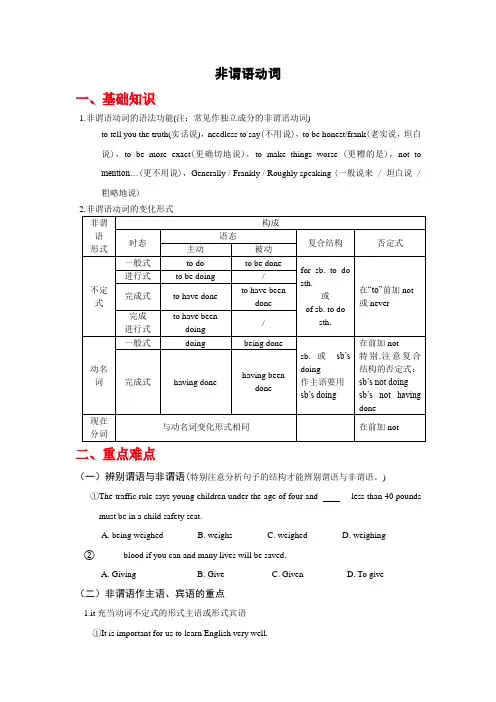
非谓语动词1.非谓语动词的语法功能(注:常见作独立成分的非谓语动词)to tell you the truth(实话说),needless to say(不用说),to be honest/frank(老实说,坦白说),to be more exact(更确切地说),to make things worse (更糟的是),not to mention…(更不用说),Generally / Frankly / Roughly speaking (一般说来 / 坦白说 / 粗略地说)(一)辨别谓语与非谓语(特别注意分析句子的结构才能辨别谓语与非谓语。
)①The traffic rule says young children under the age of four and __ less than 40 poundsmust be in a child safety seat.A. being weighedB. weighsC. weighedD. weighing②______ blood if you can and many lives will be saved.A. GivingB. GiveC. GivenD. To give(二)非谓语作主语、宾语的重点1.it充当动词不定式的形式主语或形式宾语①It is important for us to learn English very well.②I think it important for us to learn English very well.it作形式主语使用动名词的句型①It is no use/no good/useless+doing sth.Eg:It is no use crying.②It is fun(a great pleasure, a waste of time)Eg:It is a waste of time trying to explain.2.用不定式还是用动名词作宾语有特殊规定①I don’t want ____ like I’m speaking ill of anybody, but the manager’s plan is unfair.A. to soundB. to be soundedC. soundingD. to have sounded类似的知识点要记牢。
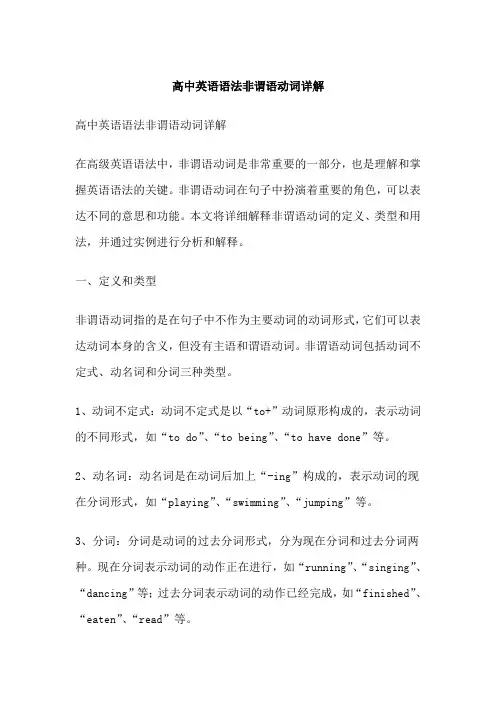
高中英语语法非谓语动词详解高中英语语法非谓语动词详解在高级英语语法中,非谓语动词是非常重要的一部分,也是理解和掌握英语语法的关键。
非谓语动词在句子中扮演着重要的角色,可以表达不同的意思和功能。
本文将详细解释非谓语动词的定义、类型和用法,并通过实例进行分析和解释。
一、定义和类型非谓语动词指的是在句子中不作为主要动词的动词形式,它们可以表达动词本身的含义,但没有主语和谓语动词。
非谓语动词包括动词不定式、动名词和分词三种类型。
1、动词不定式:动词不定式是以“to+”动词原形构成的,表示动词的不同形式,如“to do”、“to being”、“to have done”等。
2、动名词:动名词是在动词后加上“-ing”构成的,表示动词的现在分词形式,如“playing”、“swimming”、“jumping”等。
3、分词:分词是动词的过去分词形式,分为现在分词和过去分词两种。
现在分词表示动词的动作正在进行,如“running”、“singing”、“dancing”等;过去分词表示动词的动作已经完成,如“finished”、“eaten”、“read”等。
二、非谓语动词的用法非谓语动词在句子中可以扮演不同的成分,如主语、宾语、状语等。
下面我们通过具体的例子来分析非谓语动词的用法:1、动词不定式:在句子中,动词不定式可以作为主语、宾语和状语等。
例如,“To learn English is important”(学习英语很重要)中,动词不定式“to learn English”作为主语;或者在“I want to go home”(我想回家)中,动词不定式“to go home”作为宾语。
2、动名词:在句子中,动名词可以作为主语、宾语和状语等。
例如,“Playing sports is fun”(做运动很有趣)中,动名词“Playing sports”作为主语;或者在“I enjoy listening to music”(我喜欢听音乐)中,动名词“listening to music”作为宾语。
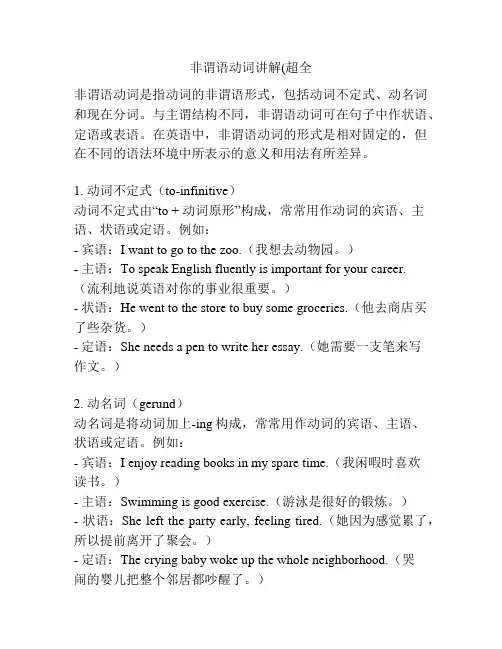
非谓语动词讲解(超全非谓语动词是指动词的非谓语形式,包括动词不定式、动名词和现在分词。
与主谓结构不同,非谓语动词可在句子中作状语、定语或表语。
在英语中,非谓语动词的形式是相对固定的,但在不同的语法环境中所表示的意义和用法有所差异。
1. 动词不定式(to-infinitive)动词不定式由“to + 动词原形”构成,常常用作动词的宾语、主语、状语或定语。
例如:- 宾语:I want to go to the zoo.(我想去动物园。
)- 主语:To speak English fluently is important for your career.(流利地说英语对你的事业很重要。
)- 状语:He went to the store to buy some groceries.(他去商店买了些杂货。
)- 定语:She needs a pen to write her essay.(她需要一支笔来写作文。
)2. 动名词(gerund)动名词是将动词加上-ing构成,常常用作动词的宾语、主语、状语或定语。
例如:- 宾语:I enjoy reading books in my spare time.(我闲暇时喜欢读书。
)- 主语:Swimming is good exercise.(游泳是很好的锻炼。
)- 状语:She left the party early, feeling tired.(她因为感觉累了,所以提前离开了聚会。
)- 定语:The crying baby woke up the whole neighborhood.(哭闹的婴儿把整个邻居都吵醒了。
)3. 现在分词(present participle)现在分词由动词原形加上-ing构成,常常用作动词的宾语、主语、状语或定语。
例如:- 宾语:He enjoys playing soccer on weekends.(他喜欢周末踢足球。
)- 主语:Listening to music helps me relax.(听音乐帮助我放松。
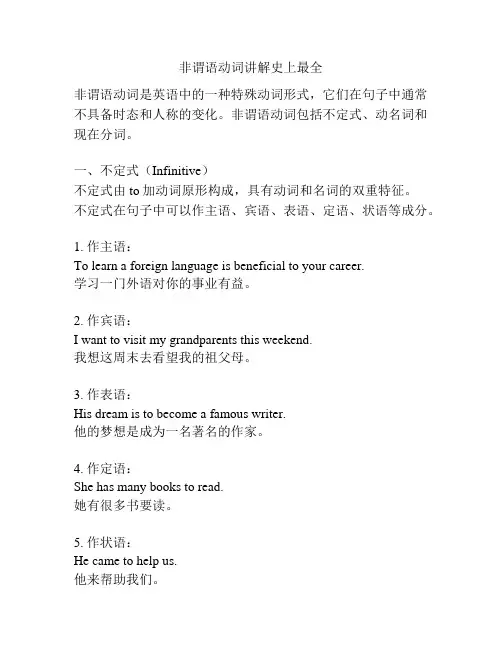
非谓语动词讲解史上最全非谓语动词是英语中的一种特殊动词形式,它们在句子中通常不具备时态和人称的变化。
非谓语动词包括不定式、动名词和现在分词。
一、不定式(Infinitive)不定式由to加动词原形构成,具有动词和名词的双重特征。
不定式在句子中可以作主语、宾语、表语、定语、状语等成分。
1. 作主语:To learn a foreign language is beneficial to your career.学习一门外语对你的事业有益。
2. 作宾语:I want to visit my grandparents this weekend.我想这周末去看望我的祖父母。
3. 作表语:His dream is to become a famous writer.他的梦想是成为一名著名的作家。
4. 作定语:She has many books to read.她有很多书要读。
5. 作状语:He came to help us.他来帮助我们。
二、动名词(Gerund)动名词由动词原形加-ing构成,具有动词和名词的双重特征。
动名词在句子中可以充当主语、宾语、表语、定语、状语等成分。
1. 作主语:Swimming is my favorite sport.游泳是我最喜欢的运动。
2. 作宾语:I enjoy reading novels in my free time.我喜欢在空闲时间读小说。
3. 作表语:Her hobby is singing.她的爱好是唱歌。
4. 作定语:The running water is clear.流动的水很清澈。
5. 作状语:She went shopping after finishing her homework.她在完成作业后去购物。
三、现在分词(Present Participle)现在分词由动词原形加-ing构成,具有动词和形容词的双重特征。
现在分词在句子中可以充当定语、表语、状语等成分。

非谓语全面讲解非谓语是指动词的非时态形式,包括不定式、现在分词和过去分词。
非谓语作为动词的补语、定语、状语等,能够丰富句子结构,增加句子信息量,提升句子的表达能力。
下面对非谓语的各种形式及其用法进行全面讲解。
1. 不定式(Infinitive)不定式一般由to加动词原形构成,常见的形式有一般式(to do)、完成式(to have done)和进行式(to be doing)。
(1)作主语To learn a foreign language is helpful.使得外语学习是有益的。
(2)作宾语I want to go shopping.我想去购物。
(3)作表语Her dream is to become a doctor.她的梦想是成为一名医生。
(4)作定语He is the person to ask for help.他是向他求助的人。
(5)作状语She practices every day to improve her English.她每天练习以提高自己的英语。
2. 现在分词(Present Participle)现在分词是动词的进行式形式,一般以-ing结尾。
(1)作定语The running water is very clear.流动的水很清澈。
(2)作状语Walking along the street, I found a lost cat.我在街上走的时候,发现了一只走失的猫。
(3)作补语I saw him standing in the corner.我看见他站在角落里。
3. 过去分词(Past Participle)过去分词是及物动词的过去分词形式或系动词be的过去分词形式,通常以-ed结尾或者是不规则变化的形式。
(1)作定语The broken window needs to be repaired.需要修理那扇破窗户。
(2)作状语They arrived at the airport, tired and hungry.他们到达机场时,又累又饿。
非谓语动词讲解以及例句非谓语动词是指动词的非谓语形式,不受主语的人称和数的限制,常用作句子的宾语、定语或状语。
非谓语动词包括动名词、不定式和分词三种形式。
一、动名词(-ing形式):1. 作主语:Being kind to others is always a good thing to do.(对他人友善总是值得做的好事。
)2. 作宾语:I enjoy swimming in the ocean.(我喜欢在海里游泳。
)3. 作宾补:She made a decision, ending their relationship.(她做出了一个决定,结束了他们的关系。
)4. 作定语:The running water is so clear and refreshing.(流动的水非常清澈和令人神清气爽。
)5. 作状语:Knowing the answer, he raised his hand.(知道答案后,他举手了。
)二、不定式(to + 动词原形):1. 作主语:To learn a new language is challenging but rewarding.(学习一门新语言是具有挑战性但值得的。
)2. 作宾语:She wants to visit Paris next year.(她想明年去巴黎旅游。
)3. 作宾补:I need to finish this report by tomorrow.(我需要明天之前完成这份报告。
)4. 作定语:He is the best person to ask for help.(他是寻求帮助的最佳人选。
)5. 作状语:She went to the library to study.(她去图书馆学习。
)三、分词:1. 现在分词(-ing形式):The crying baby woke up the entire neighborhood.(哭闹的婴儿吵醒了整个社区。
非谓语动词知识要点:一、非谓语动词种类及句法功能(一)概述:在英语中,不作句子谓语,而具有除谓语外其他语法功能的动词,叫做非谓语动词。
非谓语动词有动词不定式(the Infinitive);动名词(the Gerund);现在分词(the Present Participle);过去分词(the Past Participle)。
1、非谓语动词与谓语动词的相同点有:1)如果是及物动词都可与宾语连用,例如:They built a garden.They suggested building a garden.2)都可以被状语修饰:The suit fits him very well.The suit used to fit him very well.3)都有主动与被动, “体”式(一般式;进行式;完成式)的变化。
例如:He was punished by his parents.(谓语动词被动语态)He avoided being punished by his parents.(动名词的被动式)We have written the composition.(谓语动词的完成时)Having written the composition, we handed it in.(现在分词的完成式)4)都可以有逻辑主语They started the work at once.(谓语动词的逻辑主语)The boss ordered them to start the work.(动词不定式的逻辑主语)We are League members.(谓语动词的主语)We being League member, the work was well done.(现在分词的逻辑主语)2、非谓语动词与谓语动词的不同点有:1)非谓语动词可以有名词作用(如动词不定式和动名词),在句中做主语、宾语、表语。
2)非谓语动词可以有形容词作用(如动词不定式和分词),在句中做定语、表语或宾语补足语。
高中英语非谓语动词讲解非谓语动词包括不定式(to do)、动名词(-ing)、现在分词(-ing)和过去分词(-ed)。
它们不受主语人称和数的限制,不能充当谓语,但可以充当句子的其他成分,并且有时态和语态的变化。
动词不定式没有人称和数的变化,不能独立作谓语,但可以有自己的宾语和状语。
一般式表示的动作或状态发生在谓语动词表示的动作或状态的同时或之后,而进行式表示动作正在进行,与谓语的动作同时发生。
动名词相当于名词,可以作主语、宾语、表语、宾补、定语和状语。
它往往有将来意味,指经常性、惯性的动作或有现在意味。
现在分词和过去分词分别相当于形容词和副词,可以作定语和状语。
现在分词往往有进行意味,而过去分词则表示被动或完成的意义。
在上述各种非谓语动词形式之前直接加not可以构成否定式。
此外,动词不定式还有完成式、进行式和完成进行式,分别表示完成、正在进行和完成正在进行的动作或状态。
被动形式则表示该动作或状态的承受者。
需要注意的是,当不定式的逻辑主语是这个不定式所表示的动作的承受者时,不定式一般要用被动式(to be done)。
例如,The building to be finished next month is for our ___.3.关于不定式的完成式:当不定式所表示的动作或状态发生在谓语动词所表示的动作或状态之前时,使用完成式。
如果带有被动含义,则使用完成被动式(to have been done)。
例如:据说他写了一本关于长征的小说。
他据说在儿时学过法语。
4.关于不定式的完成进行式:如果不定式的动作在谓语所表示的时间之前一直在进行或可能继续进行,则使用完成进行式。
例如:我们很高兴一整个月都在和专家们一起工作。
二、不定式的用法:1.不定式做主语:不定式作主语一般表示具体的某次动作,而动名词doing则表示惯性的、经常性的动作。
具体表现为:1)不定式作主语时,谓语使用单数形式,例如:做这样的事情是愚蠢的。
非谓语动词语法详解.一.主语.1. 动名词和不定式作主语时,都可以用it 作形式主语,构成句型:it +be +表语+to do /doing sth. 当用作表语的是important , essential, necessary , unnecessary, possible, impossible, easy , difficult 等表示客观情况的形容词时,常用不定式作主语;当用作表语的是no use, no good, useful, useless, worth, worth while, a waste of time 等表主观短语时,常用动名词作主语。
Eg: it is important for us students to learn english well.It is impossible for them to finish the work within two hours.It is no use arguing with him about the matter.I don’t think it’s much good writing to him.It’s a waste of time trying to persuade her to agree.2.动名词短语作主语时表示抽象动作,通常不与特定的动作执行者联系在一起;不定式作主语表示具体动作,往往与特定的动作执行者联系在一起。
Eg: lying is wrong. (泛指)To lies is wrong. (特指)It’s no use crying over split milk.He realized that it was no use to go on like this.二.. 非谓语作宾语1.1)Would you mind lending me your English dictionary for a while?2) She can’t help crying after she listened to the sad story .3) I suggested trying it in a different way .4) I ‘ve been looking forward to hearing from you for a long time.5) He insisted on finishing the work before going home.6) Upon returning from Beijing, he went to visit his friends.7) He took a great delight in helping others.8) he didn’t metion having met me .9) I still remember having ever worked with him .10) I enjoyed watching TV program in the evening.11) the car needs reparing .12) the problem deserves explaining .13) This phonomenon requires studying carefully.14) The book is worth reading We don’t allow smoking in the classroom.He dislikes seeing her again.Mary is considering going abroad.Have you finished checking these machines?Working conditions keep improving, and production keeps going up , as well. He really appreciates having time to relax.He is fond of learning English.She left without telling me.1) I need to fetch a tape from a friend2) do you want me to find one stamp for you ?3) I have arranged to meet here at 10:00.I’d prefer to walk there this morning.I’d hate to leave you like that .She’d like to chat with university students.扩:1) agree , afford , aim , apply , arrange, ask , choose, claim, decide, demand, determine, fail , hope , learn , offer, plan , pretend, promise, refuse, want 等后只用to do .2)admit , allow , appreciate , avoid , consider, deny , dislike, encourage,enjoy, escape , excuse, finish , forbid , imagine, keep , mind , permit , practice 等词后只用doing3)stop doing sth / to do sth 停止做某事/停下来去做某事remember doing sth/ to do sth. 记得做过某事/记住要去做某事forget doing sth/ to do sth 记了做过某事/ 忘了做某事regret doing sth / to do sth 后悔做过某事/ 遗憾地。
非谓语:(不能单独做谓语,但同时仍保留动词某些特征的动词形式。
非谓语动词除了不能独立作谓语外,可以承担句子的任何成分。
)一、不定式与动名词做主语1.动名词做主语往往表示普通的、一般习惯的行为,不定式做主语常表示某次具体的行为。
例句:Reading English is really a great fun.<这里不强调看一次,看两次……表示的是一般性的行为>To read english this morning will take most of my time.<这里用不定式表示一次具体的行为>2.形式主语it 的运用:1).不定式做主语,谓语用单数。
往往用it做形式主语,把不定式放在谓语后面。
例句:To finish the job took us two hours.It took us two hours to finish the job.(注:在不定式做主语的被动语态句子中,必须用形式主语it.)例句:it was decided to go for a picnic tomorrow.2).It is+adj.of/for sb.to do sth.当不定式的逻辑主语和前面的形容词构成系表结构时,用of,否则用for.例句:It’s very nice of you to help us.<此时,不定时的逻辑主语是you,adj.是nice,二者构成系表结构,即可以说you are nice.此时应该用of>It’s impossible for us to defeat the boss.<此时就不能说we are impossible.因此应该用for >3).用动名词做主语的句型:It is/was no good(use, useless, fun)+doing sth. It’s worth while doing例句:It’s no use cry over spilt milk.覆水难收(it 用法远不止这几个后面会有补充)3.成分对称:主语和表语都是非谓语动词时,应保持形式上一致。
例句:To see is to believe.Seeing is believing.眼见为实4.There be no +ving例句:There is no parking around here.No smoking,please.练习题It is hard_________ his mind.(to change )It is fun__________ with a foreign man.(talking)There is no ________what will happen.(telling)I like_________ this novel this morning.(to read)二:做表语1.不定式做表语表具体个别的动作或有将来的含义。
例句:My wish is to become a famous writer.2、现在分词做表语表示主语的性质与特征,表主动(interesting, amusing, disappointing, puzzling, exciting等);进行时表示正在进行的动作。
例句:i am teaching the child to swim when you passed by.The story is amusing. (令人....的)3. 过去分词作表语表示主语所处的被动状态或完成某动作的状态。
例句:The shop is closed.<表状态>The door was closed by the wind.<表被动>4. 注意如下动词的现在分词与过去分词用法不同:其实这些都是使役动词。
interest,surprise,frighten,excite,tire,please,puzzle,satisfy,amuse,disappoint,inspire,worry.The book is interesting.The news is surprising.The story is fritenting.He is fritented.After hearing the exciting news, he gave a speech in an excited voice. 练习题The problem is _____(puzzling)The village is_______by mountains. (surrounded)She is________ at the news.(surprised)三:做宾语1 只能用动名词做宾语的动词<口诀>a考虑建议盼原谅…cosider suggest/advise look forward to doing excuse/pardenb承认推辞没得想…admit delay/put off fancyc避免错过继续练…avoid miss keep/keep on practicee否认完成就欣赏…deny finish enjoy/appreciatef禁止想象才冒险…forbid imagine riskg不禁介意准逃亡…can’t help mind allow/permit escape此外:be used to/lead to /devote to /go back to /object to /get done to /pay attention to /can’t stand /give up /feel like /insist on /thank you for /apologize for /be busy (in)have difficulty 、trouble in//have a good/wonderful/hard time in //spend time in 等动词词组后面也加doing。
2.跟动名词或不定式做宾语,有区别的。
1).like,love,prefer后接动名词,表经常性的行为;接不定式,表具体的某次行为。
如前有would/should,则后接不定式。
但feel like 只接动名词做宾语。
例句:I like swimming ,but I don’t like to swim this afternoon.2).在allow, advise, forbid, permit后,如后有名词或代词做宾语,则用不定式做宾补。
即allow, advise, forbid, permit +doing sth. / sb.to do sth.例句:We don’t allow smoking in the hall.We allow you to smoke here.3).当need, require, want做“需要”讲时,其后必接to be done(被动态)或ving(此时ving也表被动意义),表事情需要被做。
want/need/ require+动名词主动式=want/need/require+不定式被动式即need/want/require(需要)+to be done/doing/sb.to do sth例句:The window needs/want/requires to be cleaned/cleaning.4).worth后必须接动名词主动形式表被动。
即be worth +名词/doingbe worthy to be donebe worthy of +名词/being done例句:The place is worth visiting.The place is worthy to be visitedThe place is worthy of + a visit/being visited.5).在介词but, other than之后的不定式。
如介词前有“do”,则不定式省略“to”,否则就带“to”.<前有do,后无to>例句:We could do nothing but/other than wait.He had no choice but to wait.另接不定式省略to的有:can’t choose but, can’t help but(只好), can’t but,had better, would rather.Eg:He cannot choose but stay on.You had better come here on time.I would rather stay than otherwise.6).当不定式做动词tell,show,understand,teach,discuss,wonder,find out,等词宾语时,前常带引导词how, what,whether,why,who等+to do,但why+不带to的不定式。
例句:I don’t know what to do.Can you tell me why do it?练习题:1. I can hardly imagine Peter _____ (sail) across the Atlantic.2. I would appreciate your _____ (call) back this afternoon.3. The discovery of the new evidence led to the thief ______(catch).4. She didn’t remember ______(meet) him before.5. We have always deeply regretted _____(sell) the house.6. The dictionary can’t help ______(learn) the language.7. When do you plan to leave?I mean ______ (leave) tomorrow.8. He would like _____ (sing) this song now.9. Do you feel like ______(have) a cup of tea?10. The extra money allow us _______ (buy) a car.11. This book is worth _______(read).12. This book is worthy of _______ (read).13. All cars require _______ (service) regularly.14. I wonder how _____ (solve) this problem.15. What we can do but _____ (sit) and ______ (wait).16. If you are planning to spend your money having fun this week, better ______ (forget) it---- you have got some big billscoming.四:做宾补1..感官动词see, watch, observe, look at, hear, listen to,notice等和使役动词have后情况:1).主动时,do原型表完成;现在分词doing表正在进行。